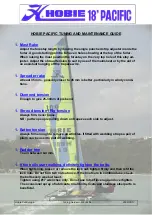
10
3837 • U3 10/07
B
oating
S
afety
S
ection
1
Other helpful publications available from the U.S. Coast Guard include
Aids to Navigation
(U.S. Coast Guard pamphlet #123), which explains the
significance of various lights and buoys; the
Boating Safety Training
Manual and Federal Requirements For Recreational Boats. Check with
your local U.S. Coast Guard station, your Marquis Dealer, or a local marina
about navigational aids unique to your area.
Documentation
The owner of a boat registered with the U.S. Coast Guard is issued a
Certificate of Number. This certificate must be onboard whenever the boat
is in use. State registration is also required. Check with the U.S.
Coast Guard or your state regulatory agency to determine what other
records are required on your boat.
In addition to required documents, it is strongly recommended that you
maintain the following logs. Log books are available from maritime
supply stores.
• A navigation log containing engine speeds, compass courses and
time records, which are essential for both cruising and maintenance
purposes.
• A radio log, which is mandatory on vessels required to have a radio.
A radio log can be useful to record unusual events, especially for
future litigation.
• A maintenance log to track the type and frequency of maintenance
procedures performed on your boat and its systems. Refer to
Section 7 for more information on maintaining your boat.
• An engine/fuel log, which is essential for calculating range and fuel
requirements.
• A GPS/Loran log if your boat contains this equipment.
Drugs and Alcohol
Drugs and alcohol adversely affect a person’s ability to make sound
judgments, react quickly and, in general, safely operate a boat. As a
responsible boater, you must refrain from using drugs or alcohol while
operating your boat. Operating a motorized boat while under the influence
of drugs or alcohol carries a significant penalty.
Distress Calls
If you have a ship-to-shore radio telephone, heed storm warnings and
answer any distress calls from other boats. The word “MAYDAY” spoken
three times is the international signal of distress. Monitor marine radio
channel 16 which is reserved for emergency and safety messages. You
can also use this channel to contact the U.S. Coast Guard or other boaters
if you have trouble.
Never send a “MAYDAY” message unless there is a
serious emergency and you are in need of immediate assistance.
Voluntary Inspections
The U.S. Coast Guard Auxiliaries or state boating officials in many states
offer courtesy inspections to check your boat for compliance with safety
standards and required safety equipment. You may voluntarily consent to
one of these inspections, after which you are allowed time to make
corrections without prosecution. Check with the appropriate state agency
or the U.S. Coast Guard Auxiliary for details.
https://www.boat-manuals.com/
















































